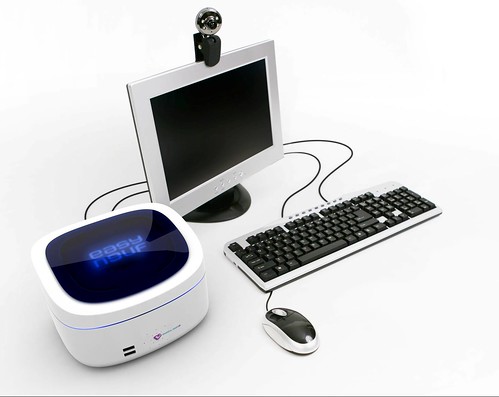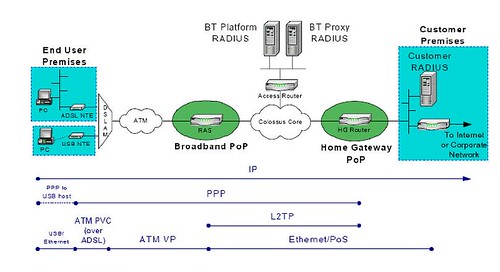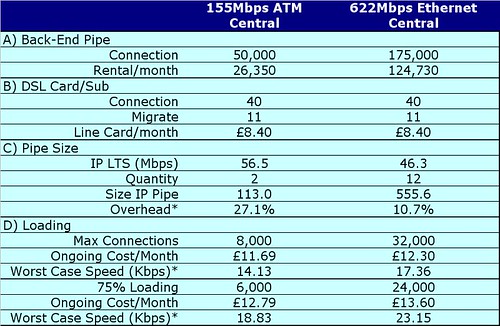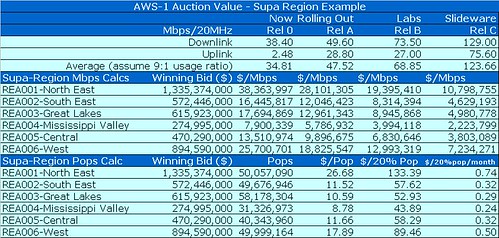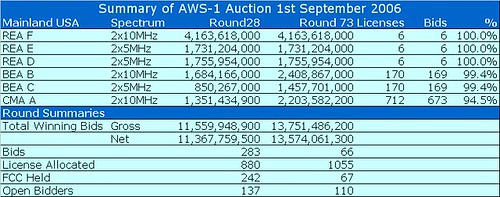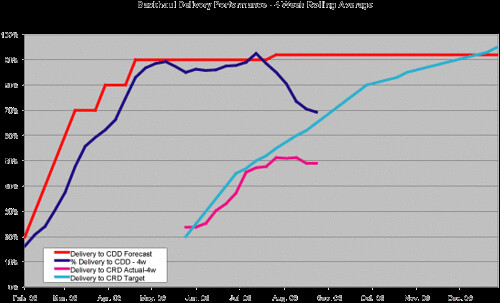Despite Pipex’s claims that
the Hoff has come through for them – with a rise in Broadband connections of 50% and an increased brand awareness of 50% from the £3m campaign, the truth seems to indicate that the vast majority of the growth is down to acquisitions.
After today’s acquisition of
Toucan (185k) and
Bulldog (110k) customer bases, Pipex claim a customer base of 1.140k which net of acquisitions is 845k. In
the last trading update, Pipex claimed total customer figures at 30 June of 832k, which basically gives organic net adds of 13k in just over 2 months. In this period the broadband base has grown from 399k to 570k today, however it is uncertain how much of this is acquired via Bulldog (nearly all will be Broadband) or Toucan (most will be low-quality CPS voice).
If we go back to the time of the
Homecall acquisition on 3rd April, Broadband customers were at 390k which grew to 399k by the 30th June - again hardly awe-inspiring organic growth.
In fact no long term Pipex followers should be surprised at this as Pipex has a history of two acquisitions per year, one in spring and one in autumn.
- 7 Sep 2006 – Toucan (£24m) and Bulldog (£12.5m)
- 3 Apr 2006 – Homecall (£43m)
- 18th Oct 2005 –
Freedom2Surf (£10m)- 24th Apr 2005 –
Donhost (£5.9m)- 9th Aug 2004 –
Nildram (£12.9m)- Apr 2004 –
Host Europe (£31.18m)- Oct 2003 –
GX Networks reversed into Pipex (£55m)
On first glance the acquisitions of Toucan and Bulldog look quite cheap especially compared to cost of previous acquisitions. The slight concern should be how much of future revenues have Pipex agreed to share with Toucan (via a voice termination deal) and C&W (via a “potentially” £250m deal over 5 years for LLU wholesaling)
Furthermore, neither of these companies is experiencing growth:
- Information on Toucan is sparse, IDT the parent company indicated 186k customers on 30th Apr taking 212k services (voice, line rental, broadband + mobile) so again the base has been static/slightly declining. Note, that Toucan has a MVNO deal with T-Mobile; and
- C&W reported 118k Bulldog customers on 31st March and actually stopped selling on 1st July. Given that Bulldog was asking for 6 month contract lengths and the legendary historical customer service problems, it might be difficult for Pipex to hold onto this base.
To make matters worse for Pipex, Bulldog attracted the tech savvy, early adopting broadband speed freaks. These customers consume a lot of bandwidth and tend to be heavy users of p2p technology. The history of Pipex with placing bandwidth caps and throttling p2p at Nildram and Freedom2Surf does not bode well for a loving relationship. It is noted that Pipex bought the Bulldog brand, website & customer base not the employees, so I would imagine that support could a future issue also. Already, throughout the various forums there are threats of walking (seemingly the consensus seems to that Be/o2 is the next victim) at the first sign of throttling.
The bonus For Peter Dubens, the Chairman of Pipex (who is also behind
ukbetting) of announcing acquisitions at the same time as results is that it reduces the focus on the operational results – no such luck for him in this blog.
The first thing to note is that Pipex, just like Tiscali is cash-strapped. At 30th June, Pipex had £37.8m in cash and net debt of £52.2m. With £32.5m of this cash going out of the door with the Bulldog (£12.5m) and Toucan (£20m), this does not leave Pipex a lot of headroom.
This would not be a problem if the overall business was generating decent cashflow – it isn’t. In the 6 months to June 2006, £1.854m was generated compared to £5.382m generated in the previous year. Worst still, the interest bill for the
£91.5m of convertible bonds issued at 3.875% will probably eat all this cashflow. Obviously being in the middle of a war with deep-pocketed companies such as BSkyB, Orange and O2, it helps not to be cash-strapped.
It makes me wonder what Intel are thinking about their
US$25m investment in the Wimax arm of Pipex. I seriously doubt whether Pipex can afford a nationwide rollout, start-up losses and triggering a price war with Vodafone who are currently the UK kings of the wireless data card market. Personally, I think Pipex are on the go slow with Wimax deployment and commitments hoping that
Clearwire and/or
Sprint in the US will generate a “bubble” of interest leading to an easy gain in asset value. I think a UK nationwide rollout of
Wimax needs BTesque deep pockets.
Operationally, Pipex is still losing money with £4.8m of net losses in the six months compared to £4.1m in the previous year. Interestingly, Pipex also booked £9.7m of unrealized losses due to the Wimax JV to bring the total losses to £14.5m. I presume this is because Intel bought in at a price below the Pipex Net Asset Value.
To be fair if I was a Pipex shareholder I wouldn’t be too worried about the operating losses. The bet with Pipex was always whether Peter Dubens could drive value through well-timed acquisitions giving a critical mass and then sell the company at a premium. I don’t think this is the case in the broadband area since the wars began; the hosting business is looking good and the Wimax business is a serious wildcard. In other words the jury is still out.
